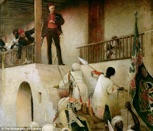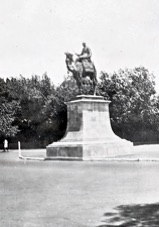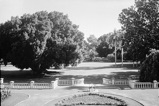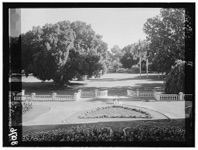glimpses of my life and thoughts

Our Family
In 1958 our family was complete with the birth of our daughter Christine, born in England. I had to stay in the Sudan and move our furniture and so on to a house in Khartoum.
Schools for English-speaking children were unavailable beyond the age of 7 or 8, which meant that eventually we had to make a choice between arranging boarding education in the UK for the boys — in common with most of our compatriots — or leaving the Sudan for good. We came to regret choosing the first alternative, for the boys were not happy away from home and parents in spite of the love and help from relatives in the UK. And we sorely missed their company at home. We were all together at Christmases, however, and as a family we enjoyed most of the long summer holidays in England.
Changing politics
A mere 73 years before we arrived in Khartoum General Gordon with tens of thousands of its inhabitants were massacred by forces led by Sidiq el Mahdi. 13 years later Kitchener avenged his death at the Battle of Omdurman and a year later the Sudan became a condominium jointly governed by Britain and Egypt, ending in 1956 when the Sudan celebrated Independence with the formation of a provisional government.
When elections were imminent in 1958 the Prime Minister, anticipating trouble, invited the army to guard key buildings. The army duly obliged and dutifully remained there for 6 years — as bloodless a coup d’état as you’re likely to get.
None of this had the slightest effect on our lives or our work, or indeed on our sense of security — we never felt threatened or at risk of any kind during our 10 years in the Sudan. The regime was tolerant of foreign minorities and there were no regulations about alcohol and so on, indeed a beer was brewed locally, though as in all predominantly muslim countries it was understood and accepted that women were expected to dress modestly in public places.
However no such tolerance was shown by the Khartoum-based government towards the South. There were many bloody conflicts and wars, finally(?) ending in 2011 when the southern states won independence.
Sharia Law didn’t come to the Sudan until 1983, twenty years after we’d left.
Working and living in Khartoum
Moving to Khartoum brought many benefits — schools for our sons (for the time being), recreational facilities and entertainments near at hand. But we missed living just a five-minute walk away from one of the world’s greatest rivers in a small community away from the trappings of modern civilisation. On the positive side we were able to meet people from a much wider circle.
Much of our free time was spent in the all-British Sudan Club on a prime site near the city centre and the river, equipped with a decent swimming pool, squash and tennis courts, with various activities laid on for children and adults. Fishing on the Nile, boating trips, picnics, visits to the zoo and so on en famille were specially enjoyable. And we both participated in several productions laid on by Khartoum Repertory.
There was much private entertainment, too, in that age of the rock-and-roll.
All this was possible because from early afternoon we had no teaching commitments. From 4 o’clock after a siesta during the intense heat of the day (no air-conditioning) our time was free to do what we wished. And with servants to look after the basics (we even had a cook at this stage) you’d be right to think we had a cushy time.
The British Ambassador decreed that the privileged position of the Sudan Club in an independent country was no longer appropriate, and after we left the Sudan Club was moved to more modest premises in the outskirts of the city.
I taught mathematics at Khartoum Technical Institute, now the Sudan University of Science and Technology, and later Anne taught commercial subjects to girls. That was the only option available to them!
From time to time I was roped in to do other things, such as becoming an unpaid English newsreader and deejay for Omdurman Radio, occasional lecturing at the University of Khartoum. and umpiring tennis matches when we were visited by touring professionals.
In a dark corner of our flat you might come across a few silver ashtrays engraved with words from the Qur’an, awarded for modest wins at tennis or squash. But I was quite chuffed to become Sudan Squash Champion for a couple of years.
Khartoum 1958-1963
Gordon’s last stand on the steps of the governor’s palace. Below, the splendid gardens at the rear, where we occasionally enjoyed the hospitality of the President



The statue of General Gordon on a camel, as it was in Khartoum when we arrived. In 1958 it was moved to Gordon’s School in Woking, where it still stands.
The statue was often pointed out to a small boy. “There’s Gordon”, he was told. After absorbing this information on several occasions, the lad eventually asked, “Who’s that riding on Gordon’s back?”
The lounge at the Sudan Club



In 1963 I applied for a post as head of mathematics and housemaster at Abbotsholme School in Derbyshire, received an acceptance by telegram (!), and cancelled the remaining two years of my contract with the Sudan government. To be truthful there was an element of nepotism about the appointment as Robin Hodgkin the Headmaster had been head of the Intermediate Schools teacher training college in the Sudan and we had enjoyed his hospitality. And a few years previously he had invited me to join his staff, before I was prepared to move. Robin was to become something of a mentor for me, and he and Elizabeth became dear friends of us both.
From UK via Naples, Benghazi, Alexandria, Cairo, Abu Simbel, Luxor and Wadi Halfa to Khartoum
The terms of my contact with the Sudan Government included 80 days annual leave with free travel, for all the family, by air or sea first class (our choice) to and from from the UK. But in 1962 we were more adventurous. After 9 years our trusty Morris Oxford was a bit arthritic, so in 1962 we broke our journey home in Paris to collect a new gleaming-white tax-free Peugeot 404 from the airport, then drove it home to use on leave before driving back to the Sudan across Europe and Africa and up the Nile as far as was possible with no more than a two-man tent and the car to accommodate two adults and three children.
Foolhardy perhaps, but vivid memories remain of this adventurous trip — the baking heat and swarms of insects at an over-crowded camp site above the Bay of Naples, sharing tent pegs with neighbours, our three children crammed into the tent as we slept in the car; after passing through Tobruk an interminable delay at the Egyptian border east of Benghazi until I asked Anne to ‘let the children loose’ in the custom house, a ruse that had the immediate effect of our being allowed to continue; swimming in the sea at Mersa Matruh, then on to Alexandria with half-an-hour or more before meeting another vehicle; a welcome overnight stop at a crowded hotel en route for Cairo; spending a while by the pyramids, then Anne and the children visited an uncrowded Cairo Museum and the famous artefacts (I’d been there long before) whilst I took the car to be serviced; onward and southwards losing our way among the myriad of small tributaries of the Nile ending up at the small town of Asyout where we met friends from Khartoum; ignoring warnings from the locals that we should be carrying a gun, continuing south along dusty dirt roads all day long, passing through an occasional village until we arrived at Luxor; and being totally gob-smacked by the sheer size of the pillars and statues at the Temple of Karnak. Then a final journey to Assuan (no dam there for years to come). We had to leave the car there for later shipment and continued our journey by paddle steamer as far as Wadi Halfa where we we boarded a train to Khartoum. Our journey took place long before trips on the Nile became a thriving tourist industry, so in the middle of the night we were able vaguely to glimpse the spotlit ruins of Abel Simbel. Its original site and the town of Wadi Halfa are now under water.
Total car miles 2,813 in 13 days of road travel. Would such a trip would be possible to repeat in the present political climate? — a special memory among the many special memories.


The Benghazi to Alexandria road
1962 Peugeot 404

from the vast Karnak
Temple Complex at Luxor




